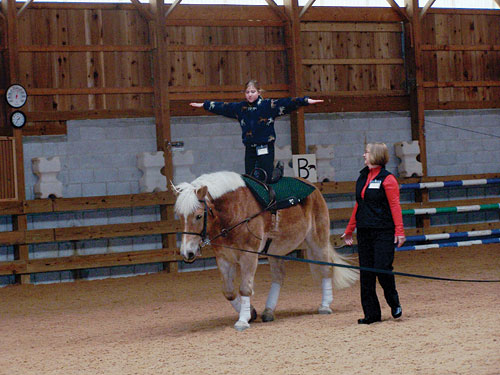 Sandra McCloskey, director of Quest Therapeutic Services, Inc. of West Chester, PA, instructs a student in vaulting.
Sandra McCloskey, director of Quest Therapeutic Services, Inc. of West Chester, PA, instructs a student in vaulting.
Vaulting is a sport children can enjoy on various levels. Now Quest Therapeutic Services, Inc. of West Chester, PA is launching a new vaulting program specifically for children with autism.
Equestrian vaulting supports the development of teamwork and social interaction, core muscle strength, balance and coordination, as well as confidence and self-esteem. Working with the horses, the children develop a partnership with the animals, their instructors and team partners.
The goal of the program is to help children with autism spectrum disorders improve social behaviors, learn teamwork and cooperation, and improve their balance and motor skills. The learning experience results in better self-control, which carries over into the children’s daily routines at home and school.
Quest Director Sandra McCloskey explains that vaulting is considered the safest of equestrian sports, primarily because the vaulter does not have to worry about controlling the horse. While that is being done by the lunger on the ground, the vaulter can concentrate on his or her own form without distraction “They say vaulting is for everyone,” she said.
To introduce the program to the community, an open house was held on Feb 26, so that interested parents could see a live vaulting demonstration and learn more about the program. Children also had a chance to meet the horses up close and get to know them.
The program will be tailored to each child that participates and their own special needs and goals. “We meet with families and know what their goals are and work on things to carry over goals at home,” said McCloskey.
A sample vaulting session would begin with meeting the horse and the team for a warm up on the ground that includes grooming and tacking up the horse, stretching exercises and games. That could be followed by work on the practice barrel to learn vaulting positions and improve balance.
“When they are really practicing the physical therapist would be looking at the alignment of the pelvis and the alignment on the practice barrel, which is very similar to the horse. Everything you do here we take and do on the moving horse,” McCloskey said. “It really does fine tune the body.”
Moving on to the mounted work, the students take turns working with the horse in the indoor arena. Some of the most basic exercises involve walking alongside the horse and matching its gait, or touching it as they circle at a walk on the lunge line.
Games Teach Skills
“We would decide what games we were going to play depending on what the goals were,” McCloskey explained how the games with horse translate to practical skills. “They’re following the leader, they’re socially interacting. They get to practice their social skills with each other. If we can improve here keeping their space behind a horse that’s walking they can keep their space walking down the hall at school.”
As riders progress they learn to mount and dismount, and hold the various vaulting positions from simply sitting on the horse to balancing on their knees or doing other poses while in motion.
McCloskey has found that the motion of the horse helps students become more aware of their own bodies. “They make you know where your body is in space,” she said. “It helps problems with body awareness such as how close they are to you or not knowing where the middle is. The instructors will be watching that and guiding that to get the most out of them.”
A cool down period ends the hour-long session and gives the student a chance to ask questions and say good-bye to the horse and instruction team.
“We’re following the guidelines of the American Vaulting Association in terms of some of these exercises,” McCloskey said, adding that the children will learn basic horse knowledge such as types of feed and colors of horses. “At the end the kids are able to apply for a certificate of completion in horsemanship skills.”
Autism Speaks Grant
The new program is being supported by a $25,000 grant from Autism Speaks, the largest autism science and advocacy organization in North America. Quest was one of just 24 organizations nationwide to receive a Family Services Community Grant from Autism Speaks this year out of a record 659 applications from organizations in 44 states.
The grants are designed to help community-based organizations across the country expand existing programs to serve more individuals with autism, and create new programs that demonstrate true innovation in providing services to improve and enrich the lives of individuals with autism spectrum disorders.
“Autism Speaks is delighted to be able to support these programs, which are not only providing important services to people with autism in their local communities, but also serving as models that we hope and expect will be replicated elsewhere,” said Autism Speaks Executive Vice President of Programs and Services Peter Bell in a recent press release.
Quest provides pediatric therapy services for children with special needs through licensed physical, occupational and speech therapists, as well as special instructors. Services are offered in a variety of settings including the home, school and community, as well as in Quest’s barn and therapy center. Nearly 200 children from birth to the age of 21 receive services each week.
Quest Therapeutic is a non-profit organization located at 461 Cann Rd., West Chester. For more information, call (610) 692-6362, or visit the Web site at www.QuestTherapeutic.com.




